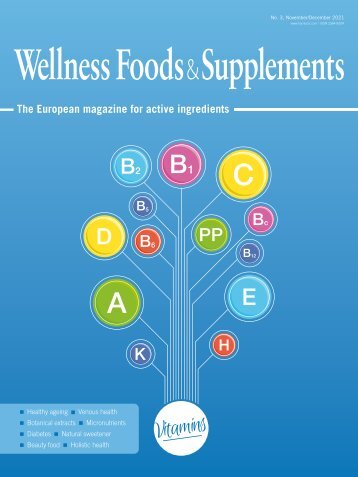Wellness Foods & Supplements 1/2020
- Text
- Supplements
- Food
- Ingredients
Omega-3 fatty acids
Omega-3 fatty acids Photo © : Adobe Stock/nenetus Omega-3 fatty acids as an alternative and complementary therapy option in depression Philipp Gebhardt, Dr. med. Frank Ingwersen Depression is a mental disorder characterized by symptoms such as depressed mood, increased pondering and drive reduction. A corresponding symptomatology can also be caused by inflammatory processes and the thereby effective cytokines (peptide hormones). Because of their anti-inflammatory effects, omega-3 fatty acids are being studied as an alternative and complementary therapy option in depression. Studies in clinical settings could show significant antidepressant effects. Depression often goes along with additional physical ailments that affect the entire life of depressive people so that they do not or only rarely succeed in coping with everyday tasks. Due to self-doubt, difficulty in concentrating and loss of interest, the affected are often impaired in their self-esteem and well-being. The consequence is a social retreat, which is associated with a high level of suffering. Even in healthy people, e. g. in the context of the experience of the loss of a beloved person, complaints occur that do not differ in their appearance from a depression and usually pass by on their own. An illness is present when the symptoms last disproportionately long or in severity and duration in an inappropriate relationship to the symptom-triggering factors. The prevalence of depression in Germany is assumed to be around 8.1 %; around 10.2 % for women and around 6.1 % for Omega_3_Depression.ai 1 02.10.2019 19:16:24 men (Fig. 1). [1] 70-79 7.7% Women 4.2% Men 60-69 9.8% 4.5% 50-59 10.4% 6.1% 40-49 9.9% 7.0% 30-39 10.5% 5.3% 18-29 11.8% 8.0% Age 0.0% 2.0% 4.0% 6.0% 8.0% 10.0% Fig. 1: Prevalence of depression in Germany in different age groups (Data from DEGS1, Robert Koch-Institut (2013), [1]) 28 No. 1 April/May 2020 Wellness Foods & Supplements
Omega-3 fatty acids ω-3/ω-6- Ratio Although the causes of depressive illnesses are complex, it is assumed that the neurotransmitters serotonin, dopamine and norepinephrine are critically involved in the pathogenesis. Pharmacothera pies that affect the metabolism of the neurotransmitters can influence appropriate symptoms in a positive way. Because about one third of the patients do not respond adequately or insufficiently to these medications, it cannot be conclusively clarified to what extent the transmitter systems are causally involved in the aetiology. [2] According to the current state of knowledge, inflammatory processes and the involved cytokines also play a significant role in the development of depression. In the case of depressive people elevated levels of certain inflammatory markers can be measured and proinflammatory cytokines have been shown to be able to cause the underlying symptoms. [3] Omega-3 Fatty acids The emergence of an inflammatory metabolic state is attributed in a significant proportion to a high dietary intake of omega-6 fatty acids. According to scientific research, around 10,000 years ago, before the start of agriculture, approximately equal amounts of omega-6 and omega-3 fatty acids were present in human diet. With the industrialization of livestock, the availability of omega-3 fatty acids has been further limited, since today’s feed of farm animals is mostly based Omega_3_Depression_Engl.ai 4 02.10.2019 19:26:12 Inflammatory Index Degenerative Chronic Diseases ≥ 10,000 Years ago 1950 2000 1:1 10:1 20:1 +/- + ++ Absent Endemic Fig. 2: It is thought that prior to the onset of agriculture, omega-6 and omega-3 fatty acids were contained in a balanced relationship in human diet. Modern diet usually provides considerably high quantities of omega-6 fatty acids and only little amounts of omega-3 fatty acids. A high omega- 6-to-omega-3 ratio favours inflammatory processes and has been shown to be linked to the development of chronic degenerative diseases. [4] on cereals and provides a significantly higher proportion of omega-6 fatty acids than the natural, green-based food. A high omega-6-toomega-3 ratio thus promotes inflammatory processes and is associated with the development of chronic degenerative diseases (Fig. 2). [4] Both omega-6 and omega-3 fatty acids are unsaturated fatty acids, which differ in that the last double bond in the carbon chain is found in the sixth-to-last (“ω-6”) and third-to-last (“ω-3”) carbon-carbon bond, respectively. Dietary fatty acids are either metabolized for energy production, incorporated into cell membranes, or used to synthesize various tissue hormones. Omega-6 fatty acids are converted by certain enzymes via arachidonic acid into predominantly pro-inflammatory signalling molecules (series II prostaglandins). The enzymes that synthesize arachidonic acid from omega-6 fatty acids are also involved in the synthesis of the essential fatty acids eicosapentaenoic acid (EPA) and docosahexaenoic acid (DHA) from the omega-3 fatty acid α-linolenic acid. A higher proportion of α-linolenic acid in the diet is advantageous because the responsible enzyme system subsequently produces less arachidonic acid and increasing amounts of EPA and DHA. EPA and DHA are directly contained in fish oils (“marine omega-3 fatty acids”), but can also be produced from certain algae. Since the conversion rates for EPA and DHA from α-linolenic acid are estimated to be low, an additional supply is recommended. The marine omega-3 fatty acids are being studied for their positive health effects in clinical settings. In a guideline published in September 2019, fish oil was recommended by the American Heart Association (AHA) for the treatment of hypertriglyceridemia. According to data from a total of 17 studies, it is estimated that elevated triglyceride levels (200-499 mg/dl) can be reduced by 20-30 % by taking 4 g of EPA and DHA daily. For strongly elevated triglyceride levels (≥ 500 mg/dl) a reduction of more than 30 % is possible. [5] In the context of cardiovascular disease, the supplementation of omega-3 fatty acids is associated with a reduced risk of arrhythmias and thrombosis and can reduce atherosclerotic vascular changes in a verifiable manner. EPA and DHA have been shown to improve endothelial function, to reduce high blood pressure and to affect inflammatory processes in a favourable way. Among other things, improvements in serotonin activity, modulation of dopamine function and a positive influence on cerebral blood flow could be highlighted in regard to mental disorders. [6] EPA and DHA in depression Various studies could confirm that the omega-3 fatty acids EPA and DHA are significantly effective in depression (Fig. 3). The antidepressant effect seems to be dependent on which of the omega-3 fatty acids or in which ratio they are supplemented. Unsaturated fatty acids form a quantitatively relevant component of the brain. Accordingly, lipids constitute about 50-60 % of the dry weight of the brain tissue, Wellness Foods & Supplements No. 1 April/May 2020 29
- Seite 1: No. 1, April/May 2020 www.harnisch.
- Seite 4 und 5: Contents Health Convenience Food Fo
- Seite 6 und 7: Cover story Photo © : Indena Ginge
- Seite 8 und 9: Cover story From the very beginning
- Seite 10 und 11: Protein sources Rich in protein, lo
- Seite 12 und 13: Bone and joint health Maintaining t
- Seite 14 und 15: Bone and joint health Organization
- Seite 16 und 17: Maternal and child health Photo ©
- Seite 18 und 19: Maternal and child health Iron is a
- Seite 20 und 21: Iron supplements for infants The re
- Seite 22 und 23: Maternal and child health Photo ©
- Seite 24 und 25: Maternal and child health also feel
- Seite 26 und 27: Maternal and child health ESI Nutri
- Seite 28 und 29: Omega-3 fatty acids to in sufficien
- Seite 32 und 33: Omega-3 fatty acids Omega_3_Depress
- Seite 34 und 35: Antioxidants Photo © : Pexels The
- Seite 36 und 37: Antioxidants Mitsubishi MGPQQ ® po
- Seite 38 und 39: Functional gummies Photo © : Adobe
- Seite 40 und 41: Functional gummies Most of the mine
- Seite 42 und 43: Functional gummies A new approach t
- Seite 44 und 45: Functional gummies Additionally, it
- Seite 46 und 47: Functional gummies growing trend to
- Seite 48 und 49: Carbohydrates in body weight, body
- Seite 50 und 51: Carbohydrates (such as glucose and
- Seite 52: See food innovation in a whole new
Unangemessen
Laden...
Magazin per E-Mail verschicken
Laden...
Einbetten
Laden...















































































































































































































































































